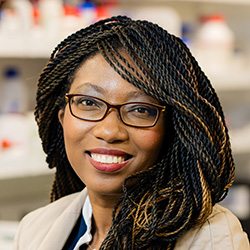Prof. Ludmilla Aristilde and her Team Awarded $1.5 Million

Prof. Ludmilla Aristilde’s proposal, titled “Quantitative Analysis of Metabolic Segregation of Lignin Deconstruction and Catabolism in Outer Membrane Vesicles of Soil Pseudomonas species,” was awarded funding from the U.S. Department of Energy’s Biological and Environmental Research (BER) Program. This funding will allocate $1.5 million to Aristilde as the principal investigator, and co-principal investigators Prof. Neha Kamat (Northwestern) and Gregg Beckham (National Renewable Energy Laboratory).
 Aristilde and her team seek to address a long-standing need in biotechnology for a biocatalytic platform that can efficiently couple lignin depolymerization and the carbon flux of breakdown derivatives to important product biosynthesis. Outer membrane vesicles in Pseudomonads have recently been implicated in lignin depolymerization and aromatic carbon catabolism, thus offering a means to develop improved biocatalysts for these two key processes. These membrane vesicles could be combined with the cellular metabolic versatility of Pseudomonads, which are well-known of being capable to process both lignin and cellulose derivatives towards biosynthetic pathways of target products. However, a major knowledge gap that prevents harnessing the functional capabilities of outer membrane vesicles is a quantitative understanding of their metabolic network and regulation in relation to the intracellular carbon metabolism. The research team plans to elucidate the reaction network responsible for the metabolic functionalities of the outer membrane vesicles in soil Pseudomonas species in fueling lignin-derived carbon fluxes towards intracellular biosynthetic pathways. This fundamental understanding is required to leverage encapsulated catabolic reactions in outer membrane vesicles towards enhancing the intracellular metabolic network for concerted lignin catabolism and valorization. This research directly addresses a fundamental research need relevant to the DOE BER mission to “understand novel microbial functional capabilities and biosynthetic pathways relevant to the production of advanced biofuels and bioproducts.”
Aristilde and her team seek to address a long-standing need in biotechnology for a biocatalytic platform that can efficiently couple lignin depolymerization and the carbon flux of breakdown derivatives to important product biosynthesis. Outer membrane vesicles in Pseudomonads have recently been implicated in lignin depolymerization and aromatic carbon catabolism, thus offering a means to develop improved biocatalysts for these two key processes. These membrane vesicles could be combined with the cellular metabolic versatility of Pseudomonads, which are well-known of being capable to process both lignin and cellulose derivatives towards biosynthetic pathways of target products. However, a major knowledge gap that prevents harnessing the functional capabilities of outer membrane vesicles is a quantitative understanding of their metabolic network and regulation in relation to the intracellular carbon metabolism. The research team plans to elucidate the reaction network responsible for the metabolic functionalities of the outer membrane vesicles in soil Pseudomonas species in fueling lignin-derived carbon fluxes towards intracellular biosynthetic pathways. This fundamental understanding is required to leverage encapsulated catabolic reactions in outer membrane vesicles towards enhancing the intracellular metabolic network for concerted lignin catabolism and valorization. This research directly addresses a fundamental research need relevant to the DOE BER mission to “understand novel microbial functional capabilities and biosynthetic pathways relevant to the production of advanced biofuels and bioproducts.”
The DOE BER program is interested in applications for research that advances the development of promising new model organisms, microbial functional capabilities, and biosynthetic pathways relevant to biofuels and bioproducts production, while researching into the metabolic pathways that can achieve synthetic polymer deconstruction and conversion to recycled monomers.
To read the DOE press release and the projects recommended for funding, click here.
